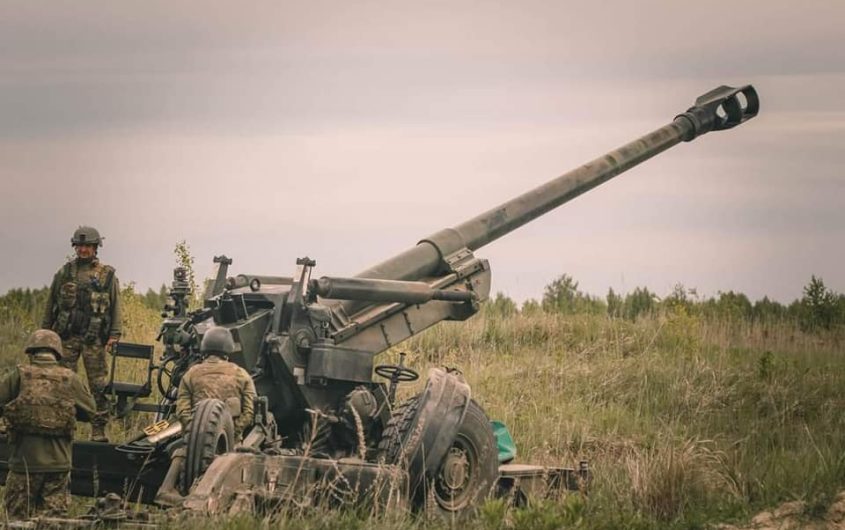
Operational Command “West” via Wikimedia Commons
Cluster Headache

John Michaud
AGI/Halle Foundation Intern
John L. Michaud is a research intern at AGI for the spring of 2022. He provides writing and research support to AGI's programs, monitors the media, documents meetings and events, and assists with database management.
Mr. Michaud is pursuing an MA in International Affairs at American University, with a focus on U.S. foreign policy and transatlantic relations. He has completed coursework on topics including U.S. security strategy, foreign policy institutions, and nationalism. In the summer of 2023, he will spend a semester at Freie Universität Berlin, where he hopes to solidify his German language skills and gain a better understanding of German and European perspectives on security policy.
Mr. Michaud graduated from the University of Virginia with a BA in Foreign Affairs and minor in German. As an undergraduate, he spent a semester studying the European Union in Freiburg, Germany. Prior to graduate school, he worked at National Journal, where he led a research team dedicated to profiling top policymakers in Washington and beyond. He grew up just outside of the Beltway in Fairfax County, Virginia.
What one headline from Munich reveals about Germany a year into the war in Ukraine
The 2023 Munich Security Conference produced several significant storylines. In general, Western leaders demonstrated unity in support of Ukraine and pledged further military support to thwart Russia’s invasion. Figures from Ukrainian President Vladimir Zelenskyy to EU foreign policy chief Josep Borrell called for swifter action to arm Ukraine. Vice President Kamala Harris accused Russia of “crimes against humanity.” China loomed large, as Secretary of State Antony Blinken met with top Chinese diplomat Wang Yi shortly after tensions flared over China’s balloon surveillance program.
Something that attracted significant attention in Germany (but less elsewhere) was Ukrainian Deputy Prime Minister Olexander Kubrakov’s public request for cluster munitions to be provided from the stocks of countries that still possess them. In remarks that were widely discussed in German media outlets, Kubrakov asserted that these weapons could help Ukraine repel Russia, which has used cluster bombs against Ukraine. Ukrainian Foreign Minister Dmytro Kuleba later backed up Kubrakov’s remarks, noting that Ukraine has not signed the international treaty banning cluster munitions. “Legally,” he stated, “there are no obstacles” for Ukraine to use cluster munitions, and Ukraine would only use them against Russia’s military.
Once fired and approaching the target, cluster munitions release numerous bomblets that disperse over a wide area. In addition to indiscriminate destruction, the frequent failure of the bombs to explode creates “a potential humanitarian impact on civilians both during as well as long after the conflict ends,” according to the United Nations. Since 2010, 110 countries—including many NATO members—have signed a UN convention that bans the “use, development, production, acquisition, stockpiling, and transfer of cluster munitions.”
Germany, a signatory of the convention, has since eliminated its stockpile. The United States has not signed the convention and still possesses cluster munitions, most of which “reside in the Army’s artillery stockpile,” according to the Congressional Research Service. In December 2022, CNN reported that Ukraine had asked the Biden administration to send some of the U.S. stockpile, which the administration neither agreed to nor completely ruled out. More reports surfaced in January that a European country, revealed to be Estonia, was seeking permission from Germany to re-export its own stockpile of German-made cluster munitions to Ukraine.
Germany’s leaders may be trying to short-circuit another re-export debate reminiscent of the recent one over Leopard tanks.
Members of the Bundestag quickly ruled out providing cluster munitions to Ukraine, while Foreign Minister Annalena Baerbock said that Germany’s support for Ukraine would be led by “humanitarian international law.” Asked about the request in an interview on public broadcaster ZDF, Defense Minister Boris Pistorius stated that “there is a limit” on providing weapons and that Germany has a “clear line” with regard to international law. Many German news outlets included cluster munitions in their conference coverage, including the Süddeutsche Zeitung, Frankfurter Allgemeine Zeitung, and taggesschau24. The Deutsche Presse-Agentur wire service distributed a story entitled “NATO Circles: Ukraine has wanted cluster bombs for months.”
Meanwhile, U.S. officials and lawmakers were quiet on Ukraine’s comments, and the cluster munitions story received scant coverage in U.S.-based media. An AP report on the conference from February 18 devoted a few sentences to Ukraine’s comments, referencing German media. Major outlets like The New York Times and Washington Post did not run stories or op-eds on cluster munitions. In Britain, a country that has also signed the UN convention, the BBC’s coverage focused on other aspects of the conference, including speeches by Western leaders and the overall state of the war. The Guardian published a brief update on cluster munitions, which discussed Germany’s reaction. In Canada, another top weapons supplier to Ukraine and convention signatory, neither the CBC nor The Globe and Mail reported on Ukraine’s request.
What might explain the discrepancy between Germany and its close allies in their reaction to Ukraine’s cluster munition comments? For well-documented historical and cultural reasons, Germany has always been more reluctant to deliver weapons to Ukraine than the United States, United Kingdom, or NATO members most directly threatened by Russia. While Germany has emerged as one of Ukraine’s largest suppliers of military aid, the German public is more divided on providing this support than the American or British public. Given Germany’s history, present public opinion, and the taboo against cluster munitions, it is not surprising that this story would resonate more in Germany than in other alliance countries. At the same time, German leaders may be eager to demonstrate that they recognize limits on arming Ukraine—and Ukraine’s cluster munitions comments provided them an opportunity to do so.
Germany’s swift refusal may have another purpose beyond signaling to a domestic audience. The hesitation to provide weapons has at times pitted Germany against NATO’s eastern countries, the members of the alliance most eager to arm Ukraine and defeat Russia. Considering Estonia’s desire to send Rheinmetall-produced cluster munitions to Ukraine, Germany’s leaders may be trying to short-circuit another re-export debate reminiscent of the recent one over Leopard tanks. Germany only green-lit the delivery of Leopards once the United States agreed to send its own main battle tanks. In this case, Germany has a strong justification for refusal based on its participation in the global convention against cluster munitions, and there is no indication that the Biden administration is prepared to deliver them. Still, reports that Ukraine has begun to use cluster munitions and a predicted shortfall of artillery supplies mean that this issue is likely to linger, despite Germany’s initial refusal.








